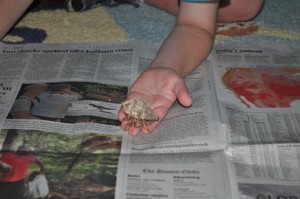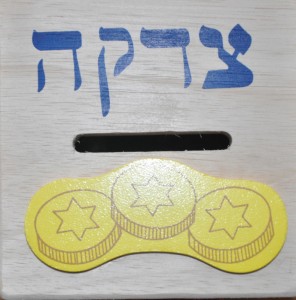July 9, 2012
My 4-year-old flailed on the floor of the pet store, screaming that he wanted a toy. I ignored his wailing and bought shells for his new pet, Squirty.
At some point, Squirty, a hermit crab, will outgrow his shell and decide it’s time to move into a new one. My son could care less about Squirty at this moment. Somewhere in the store, he had spotted a superhero toy. I’m not sure what it was. I suspect it was actually a dog toy.
“We are here to buy something for Squirty, not you today. I can’t buy you a toy every time we set foot into a store,” I said, knowing my explanation might not get through during the height of my son’s angst.
Still, maybe the message would sink in later. Simon continued wailing as I scooped him up, carried him to the car, and buckled him into his car seat. “I want a superhero toy,” he said, tears streaming from his eyes. His face was bright red.
I had grand ideas when we stopped at the pet store on our way home from a weekend in Vermont. This would part of learning how to be a pet owner, a lesson about being responsible for something other than himself. OK, his pet is the ultimate in low maintenance. Squirty lives in a two-inch long shell and lives on miniscule amounts of water and this food we bought called Hermit Crab Food Pellets. Squirty does not require walking or grooming. In fact, he prefers if we leave him alone. But since he is not living near his food supply, Squirty needs us to survive.
We had 90 minutes left of the car trip. Simon spent most of the next half hour fussing that he still wanted a toy. Lately, anywhere we have gone, Simon has expected me to buy him something. Too often, in recent weeks, I have relented. On a trip to the Museum of Science in Boston, he ran into the gift store and pointed at a large lady bug he wanted – for $6. I led him to a section with smaller, cheaper toys. He chose a $1.99 ladybug. At a children’s musical, he got a $10 flashlight toy. At the July 4th fireworks, I bought him a light-up star wand. I flushed red a few days later when a friend raised her eyebrows at seeing Simon with the toy. She had seen me buy him the first one the previous week.
My husband started to hem and haw about the expectations I was setting. I was becoming chagrined at my lack of willpower. Since Simon was 2, my husband and I have tried to downplay materialism and play up the importance of helping others, even while knowing that the concept of charity is hard for a young child. For Hanukkah a few years ago, we bought him his first tzedakah box to collect coins for charity. I also got him a book about a young boy who regularly collected change to help others. This past Hanukkah, we counted the money Simon collected and went to a grocery store and bought canned goods. As a family, we delivered two bags of food to a local pantry. Since then, I have been nudging Simon to add money to his tzedakah box. Sometimes, it works. Sometimes, it doesn’t because he prefers to put it in his own piggy bank.
At the pet store, I set the expectations clearly before we walked in, telling him we were there to buy necessities for Squirty.
In the car, as we left the pet store, Simon was persistent. He stopped fussing and tried the polite approach. “Please, can I have a super hero toy? Please, please, Mom,” he said.
I thought of a compromise. “Well, maybe we can count up the money in your piggy bank and see if you have enough for a toy,” I said.
This morning, after breakfast, Simon surprised me by raising the subject again. “Can we count up my money and go to a toy store today?” he said.
Today is one of the three days he goes to his day-care. “We can count it, but we’ll have to go after school,” I said.
I taught him to sort his money into piles of quarters, dimes, nickels and pennies. He tired after sorting half of it. We counted what he had sorted.
“$8.55,” I said. “That’s more than enough to get something. Should we give some of the rest to people who cannot afford to buy toys or food?”
He nodded and went downstairs and got his tzedakah box. Sitting on his bed again, he put several handfuls of change in it.
“Mom, where does money come from?” he asked.
“Well, it doesn’t grow on trees. Where do you think it comes from?”
“The bank,” he said.
“Not exactly. People have to work to get money. That’s why Mommy and Daddy work. That’s how we can buy you food and toys,” I said.
“Mom, if we didn’t have any money would other people use their money to give us food?” he asked.
“I think so,” I said.
“Mom, when can we go to buy more food for people who don’t have it?” he asked.
“Soon,” I said. “First, we have to count up the money in your tzedakah box, then go to the store to buy the food for them.”
He returned the tzedakah box downstairs and put his piggy bank on his dresser. Then, he stood on his stool and peered at Squirty, who huddled in a corner of the aquarium.
“I want him to move into one of his new shells,” Simon said.
“He will,” I said, “when he is ready.”







terrific. with your permission, i would like to share parts of this story. great tzedakah lessons!